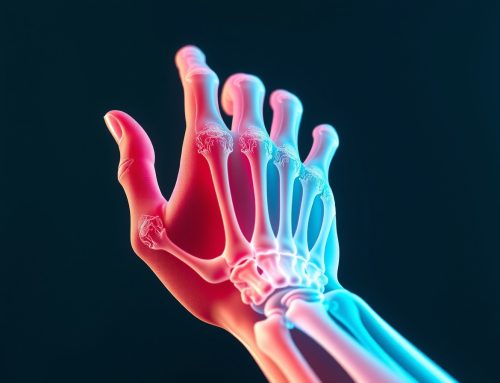
Embarking on a weight loss journey can improve overall health and well-being. However, it's crucial to approach this journey with care, as weight loss can sometimes impact bone density. If you lose too much too fast, you’re at a higher risk of developing osteoporosis. In this blog post, we'll delve into the link between weight loss and bone density, and provide practical tips on losing weight while maintaining bone health.
Understanding the Complex Relationship Between Weight Loss and Bone Density
To maintain healthy bones while shedding pounds, it's essential to understand the nuanced relationship between weight loss and bone density. Otherwise, you could quickly be on the path to osteoporosis. Let's explore the two key aspects of this relationship:
The impact of body weight on bone density
Body weight plays a crucial role in maintaining healthy bones. As living tissues, bones continually adapt to the mechanical load placed on them. When you carry more weight, your bones experience greater stress, stimulating them to become denser and stronger. However, when you lose weight, this mechanical load decreases, potentially leading to reduced bone density.
Rapid weight loss and bone loss
Research has demonstrated that rapid weight loss, particularly through very low-calorie diets, can result in significant bone loss. This bone loss occurs because rapid weight loss can cause hormonal imbalances, increased inflammation, and reduced nutrient absorption—all factors that negatively impact bone health.
Strategies for Preserving Bone Health During Weight Loss
Now that we understand the connection between weight loss and bone density, let's discuss practical strategies to help you lose weight without compromising bone health:
Aim for gradual weight loss
Gradual weight loss of approximately 1-2 pounds per week will minimize the impact on bone density and allow your body to adapt more quickly to changes in mechanical load. Patience is key when it comes to protecting your bones during weight loss.
Prioritize a balanced, nutrient-rich diet
Ensuring your diet includes adequate calcium, vitamin D, and other essential nutrients for bone health is crucial. Emphasize whole foods, such as fruits, vegetables, lean proteins, and whole grains, and avoid overly restrictive diets that can result in nutrient deficiencies. A well-balanced diet supports both weight loss and bone health.
Engage in weight-bearing exercises
Weight-bearing exercises like walking, jogging, and dancing help maintain bone density during weight loss. To achieve optimal results, aim for at least 150 minutes of moderate-intensity or 75 minutes of vigorous-intensity aerobic activity per week, plus muscle-strengthening activities on two or more days per week. Exercise not only supports weight loss but also plays a vital role in preserving bone health.
Incorporate strength training
Strength training exercises, like weightlifting or resistance bands, can boost muscle mass and preserve bone density during weight loss. Aim to include strength training in your fitness routine at least two days per week. Building and maintaining muscle mass is crucial for both weight management and bone health.
Consider supplements
If you have difficulty meeting your daily calcium and vitamin D requirements through diet alone, consider taking supplements. Consult with a healthcare professional to determine the appropriate dosage for your needs. Supplements can play a supportive role in maintaining bone health during weight loss.
Stay hydrated
Proper hydration is essential for overall health, including bone health. Aim to drink at least eight 8-ounce glasses of water daily, and consume more if you're exercising or in hot climates. Staying hydrated will help you feel your best throughout your weight loss journey.
Consult with a healthcare professional
Before starting any weight loss journey, consult with a healthcare professional to determine appropriate weight loss goals and guidance on maintaining bone health throughout the process. Having professional support will ensure you take the right steps to protect your bones while losing weight.
Monitor your bone density
Regular bone density tests can help detect potential bone loss during your weight loss journey. Discuss the appropriate frequency of screenings with your healthcare provider and any additional steps you may need to take to protect your bone health. Monitoring your progress is essential for maintaining strong bones.
Listen to your body
Pay attention to how your body feels during your weight loss journey. If you experience persistent pain, fatigue, or other concerning symptoms, consult with your healthcare provider to ensure you're not compromising your bone health. Tuning into your body's signals is vital for a successful and healthy weight loss journey.
Maintain a healthy sleep schedule
Adequate sleep is crucial for overall health, including bone health. Aim for 7-9 hours of sleep per night to give your body the rest it needs to recover and maintain optimal bone density. Prioritizing sleep will contribute to both weight loss and bone health.
Manage stress
Chronic stress can negatively impact bone health by altering hormone levels and increasing inflammation. Incorporate stress-reduction techniques, such as mindfulness, meditation, or deep breathing exercises, into your daily routine to support both weight loss and bone health. Managing stress is crucial for your overall well-being.
Consider a low-intensity vibration (LiV) device
When you’re losing weight unintentionally and are worried about your bone density, a LiV device can help improve your health. With chaotic schedules or mobility obstacles, it can be difficult to maintain healthy bone density. By standing on a LiV device for just 10 minutes per day, you can improve your bone health, stimulate blood circulation and lymphatic flow, as well as improve balance.
Losing weight can provide numerous health benefits, but it's essential to be mindful of the potential impact on bone density to avoid a higher risk of osteoporosis. By incorporating the strategies outlined in this blog post and working closely with your healthcare team, you can achieve your weight loss goals while maintaining strong and healthy bones. Remember, getting to a healthy weight and preserving bone density go hand in hand—so approach your weight loss journey with care and enjoy the benefits of a healthier, happier you. Don’t have a LiV device at home? Contact Marodyne to get one delivered to your door.
What’s your favourite bone-building exercise? If you were losing weight, what would you change about your lifestyle to support your bone health? Share your experience with our readers in the comments below.



